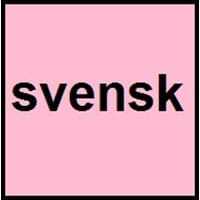Countries
China, Nepal
European Union, Finland, Nordic Council, Sweden
National Language
Nepal, Tibet
Sweden
Second Language
Not spoken in any of the countries
Finland
Speaking Continents
Asia
Antartica, Europe
Minority Language
China, India, Nepal
Australia, Belgium, Canada, France, Germany, Netherlands, Spain, Switzerland, United Kingdom, United States of America
Regulated By
Committee for the Standardisation of the Tibetan Language
Institute for the Languages of Finland, Swedish Academy, Swedish Language Council
Interesting Facts
- Tibetan dialects vary alot, so it's difficult for tibetans to understand each other if they are not from same area.
- Tibetan is tonal with six tones in all: short low, long low, high falling, low falling, short high, long high.
- In Swedish language, article comes after noun.
- Most of the words in Swedish language began "S" than any other letter.
Similar To
Not Available
Norwegian and Danish Language
Derived From
Not Available
Old Norse Language
Alphabets in
Tibetan-Alphabets.jpg#200
Swedish-Aphabets.jpg#200
Scripts
Tibetan alphabet, Tibetan Braille
Latin
Writing Direction
Left-To-Right, Horizontal
Left-To-Right, Horizontal
Hello
བཀྲ་ཤིས་བདེ་ལེགས། (tashi delek)
hej
Thank You
ཐུགས་རྗེ་ཆེ་། (tujay-chay)
tacka dig
How Are You?
ཁྱེད་རང་སྐུ་གཇུགས་བདེ་པོ་ཡིན་པས།
(kayrang kusu debo yimbay?)
hur mår du
Good Night
གཟིམ་ལཇག་གནང་དགོས་། (sim-jah nahng-go)
godnatt
Good Evening
དགོང་དྲོ་བདེ་ལེགས།
god kväll
Good Afternoon
ཉིན་གུང་བདེ་ལེགས།
god eftermiddag
Good Morning
སྔ་དྲོ་བདེ་ལེགས། (nga-to delek)
god morgon
Please
thu-je zig / ku-chee.
vänligen
Sorry
ཀོང་དགས་། (gawn-da)
ledsen
Bye
ག་ལེར་ཕེབས་། (kha-leh phe)
hej då
I Love You
ང་ཁྱེད་རང་ལ་དགའ་པོ་ཡོད་ (nga kayrâng-la gawpo yö)
jag älskar dig
Excuse Me
དགོངས་དག བཟོད་དུ་གསོལ། ཐུགས་རྗེ་གཟིགས།
ursäkta mig
Dialect 1
Central Tibetan
Dialects
Where They Speak
China, India, Nepal
Gabon
Dialect 2
Khams Tibetan
Dialects
Where They Speak
Bhutan, China
Georgia
Dialect 3
Amdo Tibetan
Dialects
Where They Speak
China
France
Speaking Population
Not Available
Second Language Speakers
Not Available
Native Name
བོད་སྐད་ (pö-gay)
Svenska
Alternative Names
Bhotia, Dbus, Dbusgtsang, Phoke, Tibetan, U, Wei, Weizang, Zang
Ruotsi, Svenska
French Name
tibétain
suédois
German Name
Tibetisch
Schwedisch
Pronunciation
Not Available
[ˈsvɛ̂nskâ]
Ethnicity
tibetan people
Swedes, Finland Swedes
Origin
c. 650
13th Century
Language Family
Sino-Tibetan Family
Indo-European Family
Subgroup
Tibeto-Burman
Germanic
Branch
Not Available
Northern (Scandinavian)
Early Forms
Old Tibetan, Classical Tibetan
Old Swedish
Standard Forms
Standard Tibetan
Standard Swedish
Language Position
Not Available
Signed Forms
Tibetan Sign Language
Tecknad svenska, ("Signed Swedish")
Scope
Not Available
Individual
ISO 639 6
Not Available
Not Available
Glottocode
tibe1272
swed1254
Linguasphere
No data Available
52-AAA-ck to -cw
Language Type
Not Available
Living
Language Linguistic Typology
Not Available
Subject-Verb-Object
Language Morphological Typology
Not Available
Not Available
Tibetan and Swedish Greetings
People around the world use different languages to interact with each other. Even if we cannot communicate fluently in any language, it will always be beneficial to know about some of the common greetings or phrases from that language. This is where Tibetan and Swedish greetings helps you to understand basic phrases in Tibetan and Swedish language. Tibetan word for "Hello" is བཀྲ་ཤིས་བདེ་ལེགས། (tashi delek) or Swedish word for "Thank You" is tacka dig. Find more of such common Tibetan Greetings and Swedish Greetings. These greetings will help you to be more confident when conversing with natives that speak these languages.
Tibetan vs Swedish Difficulty
The Tibetan vs Swedish difficulty level basically depends on the number of Tibetan Alphabets and Swedish Alphabets. Also the number of vowels and consonants in the language plays an important role in deciding the difficulty level of that language. The important points to be considered when we compare Tibetan and Swedish are the origin, speaking countries, language family, different greetings, speaking population of these languages. Want to know in Tibetan and Swedish, which language is harder to learn? Time required to learn Tibetan is 24 weeks while to learn Swedish time required is 24 weeks.





